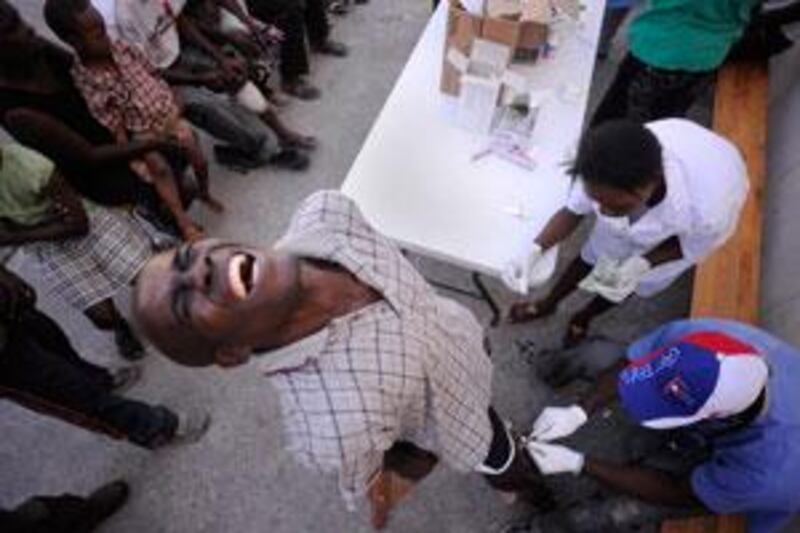WASHINGTON // The relief effort in Haiti has led to new opportunities for co-operation between the United States and Cuba and could potentially thaw the relationship between the long-time adversaries, some analysts say. Although few believe the earthquake will bring a sudden end to a complex political dispute that has spanned decades, there are some encouraging signs that both sides, for now, are willing to put aside their political differences as they assist those affected by the January 12 earthquake.
Cuban officials authorised US medical evacuation flights to cross through restricted Cuban airspace on their way from Guantanamo Bay to Florida, cutting about 90 minutes off the flight time. And US medical teams and Cuban doctors are collaborating on the ground and sharing US medical supplies, Darby Holladay, a spokesman for the US state department, said. "This development reflects our overwhelming concern for the welfare of the Haitian people," he said. "We will continue to identify areas where our co-operation can support the overall relief effort in Haiti."
Fidel Castro, Cuba's ailing former president, wrote last week in the Communist Party newspaper, Granma, of the "spirit of co-operation" among the countries responding in Haiti. "Haiti could become an example of what humanity can do for itself," he wrote. He also wrote, however, that it remains to be seen how long the co-operation will endure "before egotism, chauvinism, petty interests and contempt for other nations prevail".
Barack Obama's first year in office was marked by some optimism that the US-Cuban relationship was entering a more conciliatory phase. In April, Mr Obama eased restrictions on travel by Cuban-Americans to their families in Cuba and removed caps on the amount of money they are permitted to send home. His administration also reopened bilateral talks on the migration of Cubans to the United States and is negotiating the establishment of direct postal service to Cuba. A similar dialogue was suspended in 2004 by George W Bush, who cited a variety of concerns including Cuba's refusal to grant exist visas to Cubans who had received permission to enter the United States.
Mr Obama, however, has maintained a full embargo on trade to Cuba, which was imposed in 1962 after Mr Castro's "Cuban Revolution". Cuba continues to be listed - along with Iran, Sudan and Syria - as a "state sponsor of terrorism" and US citizens are forbidden to travel there. A new complication arose in December when Cuban authorities arrested a US citizen, Alan Gross, who was distributing laptops and internet connection equipment to Jewish groups in Cuba as part of a US government democracy promotion programme. Cuban authorities detained Mr Gross on suspicion of espionage.
Dan Erikson, a senior associate at the Inter-American Dialogue, a non-profit policy analysis group in Washington, said US-Cuba co-operation in Haiti is a positive development, but probably would not have a lasting effect on their brittle relationship. While allowing US planes to use Cuban airspace is a positive gesture, he said, it is not unprecedented. Similar permission was granted in the aftermath of the September 11 attacks.
"What this proves is that the US and Cuba are capable of putting aside political differences when it's perceived to be in their common interests," Mr Erikson, author of The Cuba Wars: Fidel Castro, the United States, and the Next Revolution, said. "But this kind of broad history of confrontation is not going to be erased by an earthquake in Haiti." Still, Julie Feinsilver, a senior research fellow at the Council on Hemispheric Affairs, said the joint US-Cuban relief work could open the two countries to a much broader form of "medical diplomacy".
"How about converting Guantanamo into a Latin American-Caribbean regional disaster relief and management centre?" she said, suggesting that doctors and relief workers are sometimes better at breaking down political barriers than diplomats and politicians. "It's not an economic competition. They are not competing for markets. They are just working together to provide a good - a need - that is in great demand in third countries."
Ms Feinsilver, author of the forthcoming book Medical Diplomacy: Fifty Years of Cuba's Soft Power Politics, said there were 344 Cuban doctors on the ground in Haiti when the earthquake struck. A memo sent last week by the Cuban government to its embassies throughout the world noted that Cuban doctors were among the first to respond to the wounded, treating close to 2,000 patients and performing more than 100 emergency surgeries in the two days after the disaster.
"Cuba is willing to co-operate with all nations on the ground, including the United States, in order to assist the Haitian people and save lives," the memo said. Not everyone has been willing to shed their political grievances, however. Remarking on the deployment of nearly 12,000 US troops to Haiti, Hugo Chavez, the Venezuelan president and an ally of the Castros, accused the United States last week of "occupying Haiti undercover".
Such sentiments were echoed by other leftist leaders in the region, including the Bolivian president, Evo Morales, who said on Thursday that the United States "cannot use a natural disaster to militarily occupy Haiti". sstanek@thenational.ae






